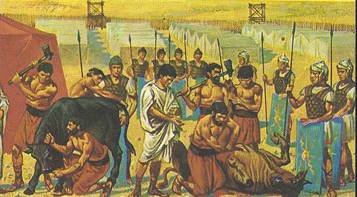Today we speak the words, “I am a World citizen,” with pride. To the people of the ancient world the statement, “I am a Roman citizen,” was a badge of high honour. Beginning as a small city state in Italy, Rome grew into a vigorous republic and finally into an empire so mighty that it included the whole of the Mediterranean world. Even after Rome’s grandeur had waned, its influence lived on among later peoples. Rome’s history is a reminder that the destiny of a nation rests more on the wisdom of its leaders and the character of its people …
Read More »Tag Archives: gaul
The End and the Beginning 378- 752
THE FIRST SIGN of the approaching Roman army was a thin column of dust. It rose like smoke from behind the jagged Thracian hills of Northern Greece, which sheltered the Visigoths’ encampment. Moments later, the Visigoths, or German barbarians, as the Romans called them, could feel the ground tremble with the tread of the imperial legions. The Romans were advancing, forty thousand strong, under the personal command of the Emperor Valens. Within the Visigoths’ barricade of wagons, all was confusion. Chieftains bellowed, calling their clans together. Sturdy Visigothic warriors dragged the wagons closer together in a protective circle. Horses neighed …
Read More »Great Church Fathers A.D. 340-430
IT WAS about the middle of Lent in Antioch, reported Jerome, when “a deep-seated fever fell upon my weakened body, and . . . it so wasted my unhappy frame that scarcely anything was left of me but skin and bone. Meanwhile, preparations for my funeral went on; my body grew gradually colder and the warmth of life lingered only in my throbbing breast. Suddenly I was caught up in the spirit and dragged before the judgment-seat . . .” Then follows a long account of his dream in which Christ scolded him for his devotion to the works of …
Read More »Rome and the Christian Church A.D. 64 -180
TRUMPETS sounded the fire alarm in Rome on the night of July 18, in the year 64. It seemed that the flames first broke out in the crowded section near the Great Circus and spread rapidly, driven by a strong wind to row after row of wooden houses. Sparks carried by the wind started other fires. People fled in panic. The fire roared on unchecked, continuing for six days and six nights. When it was finally brought under control, most of the city lay in ruins. People could not believe that one small accidental fire somewhere could have caused all …
Read More »The End of the City A. D. 192 – A. D. 476
ON ROME’S first day, Romulus took a bronze plow and drew a magic circle around seven of the hills that stood beside the River Tiber. The magic of the circle was protection against the evils outside. More important, it bound together the people who were inside, making one city where there had been six towns. Seven hundred years later, Augustus drew another magic circle, this time around all the Mediterranean world. It kept out barbarian and Asian invaders and held together millions of people, making one empire where there had been dozens of races and nations. So long as the …
Read More »The City of the World A. D. 117 – A. D. 138
ROME was no longer just a city — it was a world. In the reign of Hadrian, the blaring trumpets that announced the comings and goings of the emperor echoed in Spain, Syria and Britain as often as in Italy. Hadrian wanted to know what was going on in all of his empire. He wanted to inspect the troops and forts that held the frontiers and to judge for himself the wisdom of the governors he had sent to rule the provinces. He wanted to visit the towns and cities, to see their ancient buildings, to plan new buildings where …
Read More »The City of Augustus 29 B. C. – A. D. 14
IN 29 B.C. the gates of war were closed. Rome was at peace. Senators and the people of the mob-men who had hated and fought each other through long, bitter years — stood side by side in the Forum while the great doors of the temple of Janus were slowly pushed shut. That had happened only twice before in the history of the city. The crowd in the Forum cheered the peace and they cheered Octavius, their new ruler. He was no longer the young man who had rushed to Rome after the murder of his uncle, Caesar. Seventeen years …
Read More »The City of Caesar 80 B. C. – 44 B. C.
THE story of Rome in the years after Sulla’s death was the story of a partnership of power. It was the tale of three men who bargained for the world — a rich man, a poor man and a man who was not only a hero, but looked it. The rich man was Crassus, who had become a millionaire by setting up the only fire department in Rome. The tall buildings and narrow, crowded streets of the city made a fire a constant danger. When one house burned to the ground, the buildings on either side were likely to fall …
Read More »






